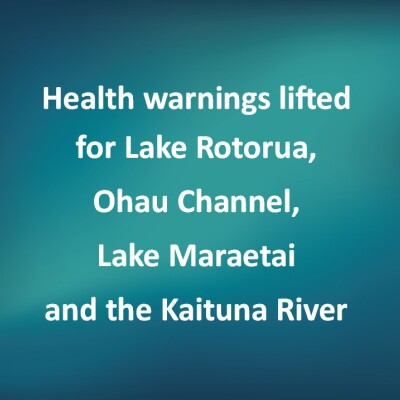
15 May 2023
Health warnings issued for Lake Maraetai, Lake Rotorua, Ohau Channel, the upper Kaituna river and at Waitangi on the Kaituna River due to cyanobacteria (algal blooms), have been lifted.
The latest water monitoring results by the Bay of Plenty and Waikato Regional Councils confirm that the algal blooms in these areas have subsided. However, health warnings remain in place due to algal blooms at Okawa Bay at Lake Rotoiti, the Okere Arm at Lake Rotoiti, Te Weta Bay at Lake Rotoiti, Lake Rotoehu, and Lake Okaro.
“People should avoid any activity which results in contact with the water in these water-ways,” says Dr Gregory Evans, Medical Officer of Health at Toi Te Ora Public Health.
Contact with water affected by algal blooms can cause asthma and hayfever attacks in some individuals. It can also cause skin rashes, stomach upsets, and in some cases neurological effects such as tingling around the mouth, headaches, breathing difficulties and visual problems.
Cyanobacteria monitoring performed by Waikato Regional Council has now ceased, whilst monitoring by Bay of Plenty Regional Council continues at present.
It is important to know the signs of algal bloom, says Dr Evans. “If the water looks discoloured, smells unusual, or if there is scum or leathery mats of black or brown algae on the surface of lakes or on the beds of rivers, it’s best not to enter the water or eat shellfish from the area.”
“Algal mats and scum may also accumulate along the shoreline of lakes and so it’s especially important that parents ensure that children avoid contact with these as they may be toxic,” says Dr Evans.
Toi Te Ora will continue to monitor areas where health warnings are in place and provide updates if conditions change.
Current local health warnings and recreational water information can be found through these channels: